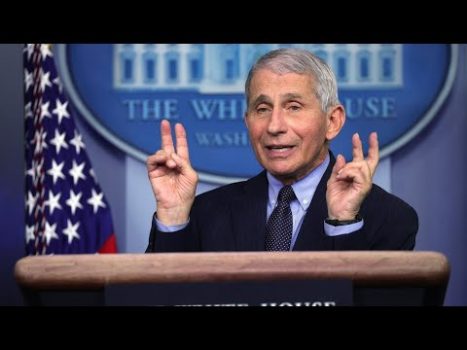Fauci funded ‘bat-human interface’ research in China to avoid an outbreak in the US

The top US infection disease expert Dr Anthony Fauci has made a groundbreaking admission that he funded coronavirus research in China to avoid an outbreak on American soil, Sky News host Sharri Markson reports.
“The United States funded highly dangerous coronavirus research that was once banned at the Wuhan Institute of Virology,” she said.
“That research involved creating new deadly viruses that never existed before.
“Back in 2012, when the US was considering banning gain of function research, which it later did, Fauci argued that it was important work and was even worth the risk of sparking a pandemic.
“But when the outbreak of the pandemic exploded and the White House was sitting there wondering how it all started, Fauci did not once mention gain of function research or the other activities at the Wuhan laboratory.
“It was left to others to uncover.
“Fauci is the man solely responsible for lifting the US ban on this risky research in 2017.”
Ms Markson said it was “unthinkable” for the US to want “risky coronavirus research” conducted in China.
What is “gain-of-function” research and did the NIAID fund it in this case?
In recent news, it has been reported that Dr. Anthony Fauci, the director of the National Institute of Allergy and Infectious Diseases (NIAID), funded “bat-human interface” research in China in order to avoid a potential outbreak in the United States.
The research in question involves the manipulation of coronaviruses in order to study their potential for causing disease in humans. The study was conducted by the Wuhan Institute of Virology in China, and was partially funded by the NIAID, which is a part of the National Institutes of Health.
This revelation has led to controversy, with some questioning the ethics of funding research in a country with a history of poor laboratory safety practices. The Wuhan Institute of Virology has been subject to scrutiny in the past over concerns about the safety protocols in place for handling highly infectious pathogens.
However, Fauci has defended the decision to fund the research, stating that the aim was to better understand the potential threats posed by coronaviruses and to develop strategies to prevent future outbreaks.
In a statement to National Geographic, Fauci said, “It would have been almost derelict for us not to support research that could lead to a better understanding of how these viruses could infect humans and how we might be able to prevent that.”
Fauci has also stated that the NIAID did not fund “gain-of-function” research, which involves intentionally increasing the virulence of a pathogen, as some have suggested. He has asserted that the research focused on studying the natural evolution of coronaviruses in bats and other animals, in order to gain a better understanding of how they could potentially jump to humans.
While the origins of the COVID-19 pandemic are still under investigation, it is clear that the virus has had a significant impact on global health and the global economy. The decision to fund research in China, at a facility that has been criticized in the past, may be seen by some as a misstep. However, Fauci and others have defended the decision as one that was critical for understanding and preventing future outbreaks.
As the world continues to grapple with the ongoing COVID-19 pandemic and prepares for future outbreaks, it is important to consider the role that scientific research plays in understanding and mitigating the spread of infectious diseases. The controversy surrounding the funding of “bat-human interface” research highlights the need for transparent and ethical practices in scientific research, particularly when it comes to studying potentially dangerous pathogens.